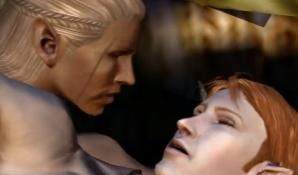Gay video gamers received extra attention last autumn when a clip of same-sex passion from Dragon Age: Origins, a role-playing game developed by Edmonton-based BioWare, hit YouTube. In it, a human man and an Orlando Bloomian elf flirt in front of a campfire before ending up horizontal — in a few different positions.
The video game industry has been around for nearly four decades, and today the popularity, and influence, of video games is undeniable. According to US market research firm The NPD Group, 2008 sales figures for video games and systems reached almost $23 billion in the United States, easily outstripping the music industry ($11 billion), the DVD market ($15 billion) and the film box-office take ($10 billion).
Video games have evolved into more than just curiosities; over the last decade they have become hugely influential in global pop culture. A handful of queer-oriented sites like Gamers Experimentations, GayGamer.net, Gaymer.org, and LesbianGamers.com have drawn groups of previously unconnected queer gamers together.
The internet fuelled the growth of the industry by removing the barrier of geographic proximity: Online play allowed people to connect virtually with other players around the world and shifted multiplayer action from the two controllers in the basement to potentially millions. But the anonymity that’s possible on the internet also allows virtual communities to become easy forums for homophobia.
According to a 2006 University of Illinois survey, four out of five queer-identified gamers reported widespread pejorative use of the words “gay,” “queer,” “fag” and “faggot.” Three-quarters of respondents said they experienced homophobia directly. Clearly, there is work to be done.
Recently, Infinity Ward, the developer behind Modern Warfare 2, a first-person shooter that grossed more than $600 million in five days, drew controversy with a short video about unfair game tactics that featured a fictional group called Friends Against Grenade Spam, or FAGS. Robert Bowling of Infinity Ward tried to deflect the outrage by calling the ad “social commentary.” The video was subsequently pulled.
Not every straight gamer is homophobic, nor do most games elicit such talk, but the industry, especially in North America, is focused on straight white males. This isn’t really homophobic in itself, but many games define masculinity as loud, heterosexist bravado, inevitably setting up online conflict when someone doesn’t fit the convention.
In the end, this is why the Dragon Age: Origins clip isn’t trivial. For this industry, it is one of only a few forays into gay-positivity and gay-sex positivity.
This is important given that, while the age of the average gamer is 35, a solid 25 percent of them are under 18. Trying to reconcile your budding sexuality with anti-gay sentiments from the virtual community must be frustrating at a time in life when everything feels so tentative. A game like Dragon Age: Origins may provide a welcome reprieve from haters and a safe testing ground in which to experiment.
BioWare is one of the few developers to be more inclusive in its games: Other notables include Lionhead Studios and Rockstar. Our community is strengthened when developers are encouraged to allow options for queer gamers that fully reflect themselves. The next generation could then use video games as another means of discovering its identity, as previous ones used film, music and literature.
Video games, after all, are an opportunity to project who we want to be, whether it’s finding wish-fulfillment rocking in an imaginary band, embodying a skillful soldier or, yes, even seducing an elf.


 Why you can trust Xtra
Why you can trust Xtra


